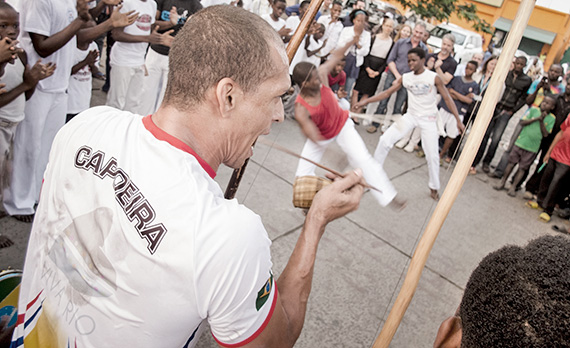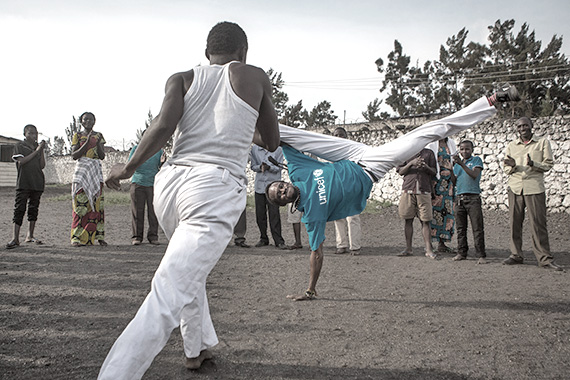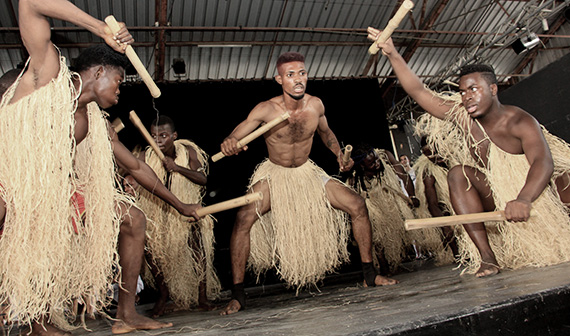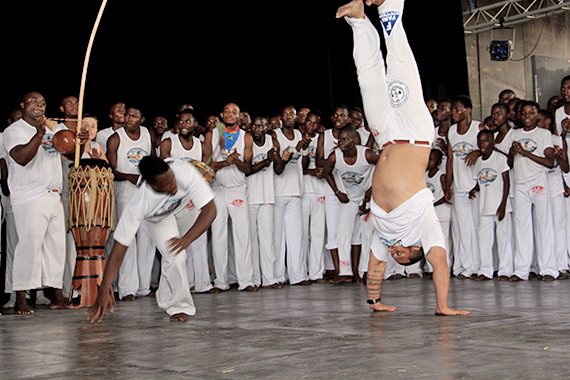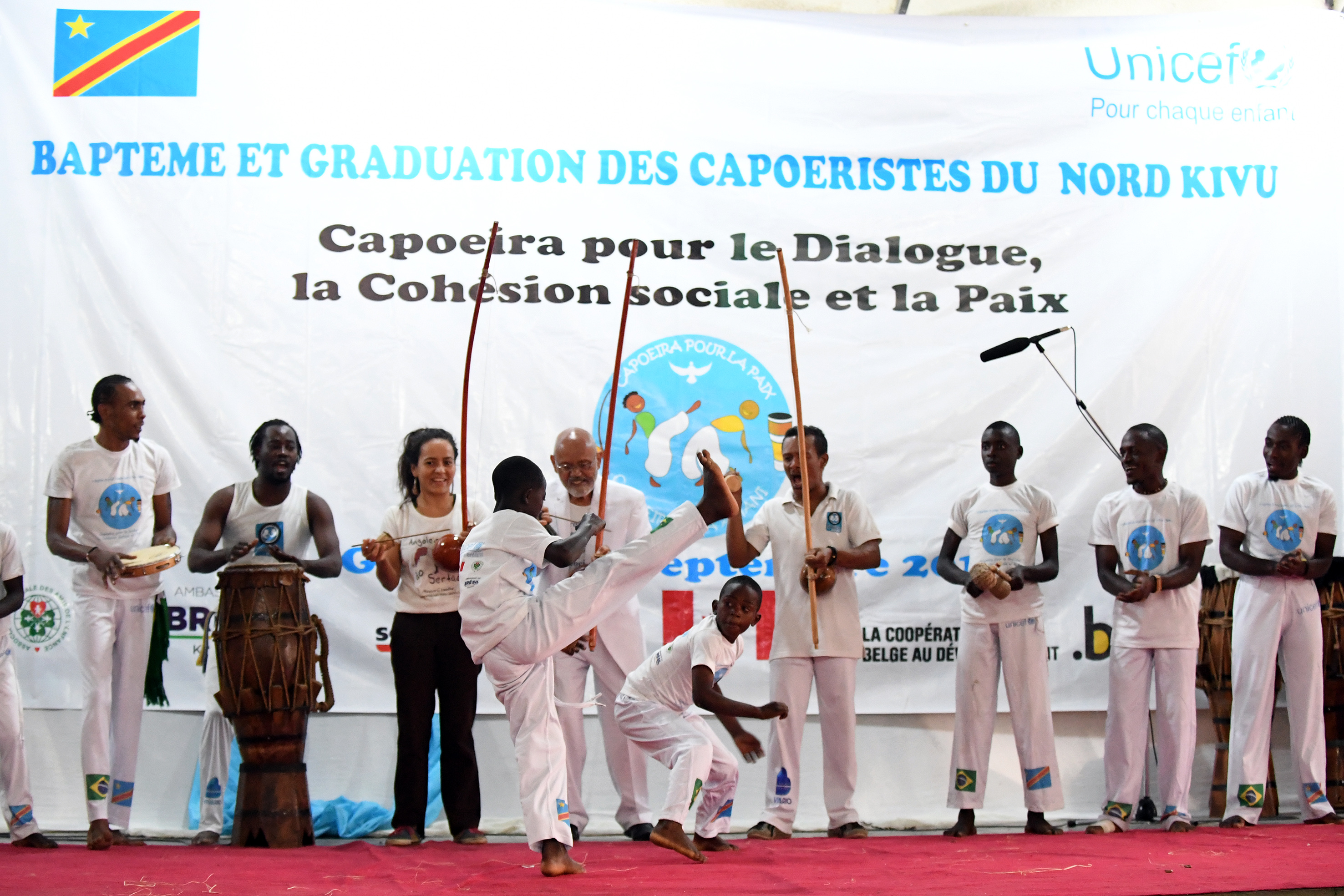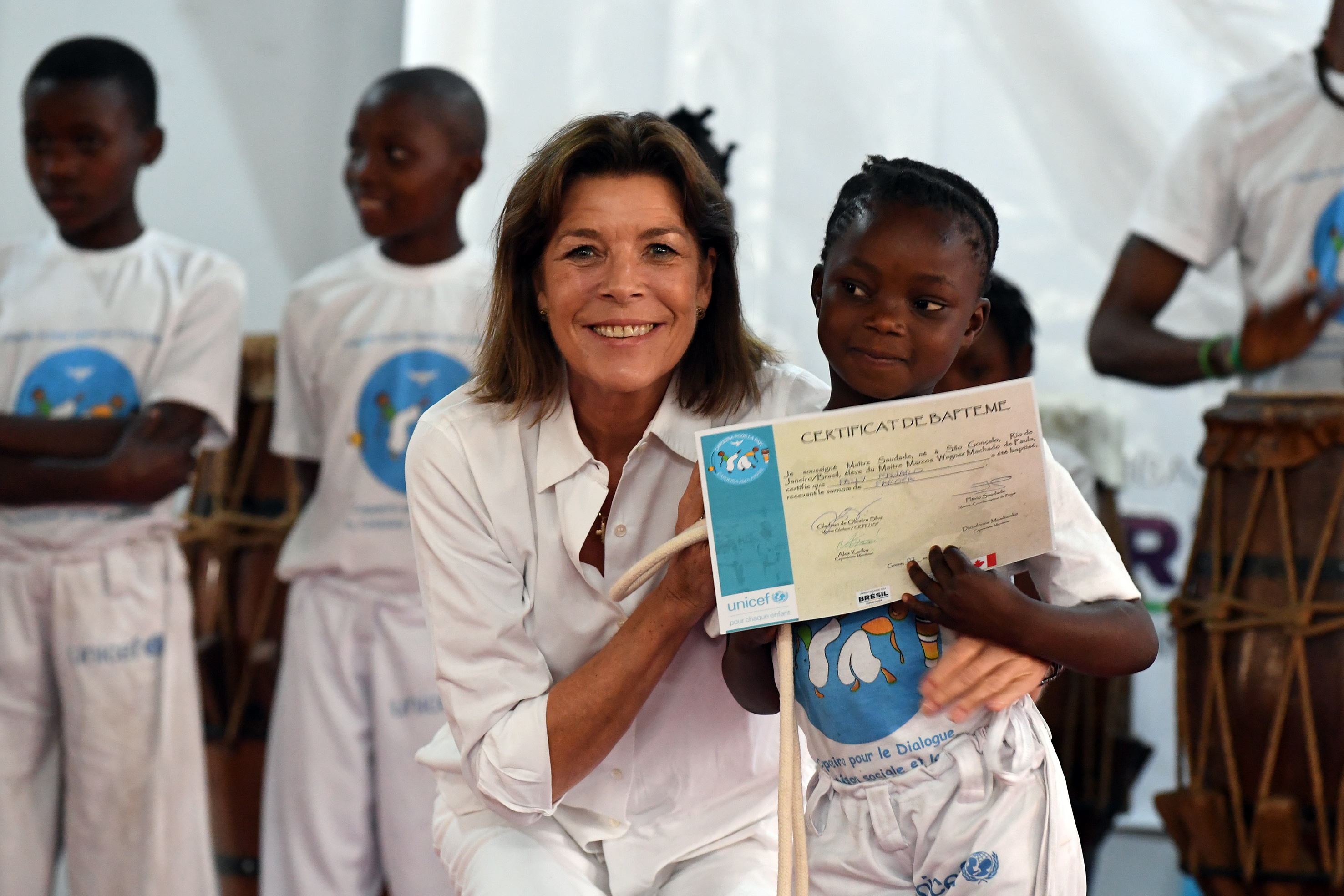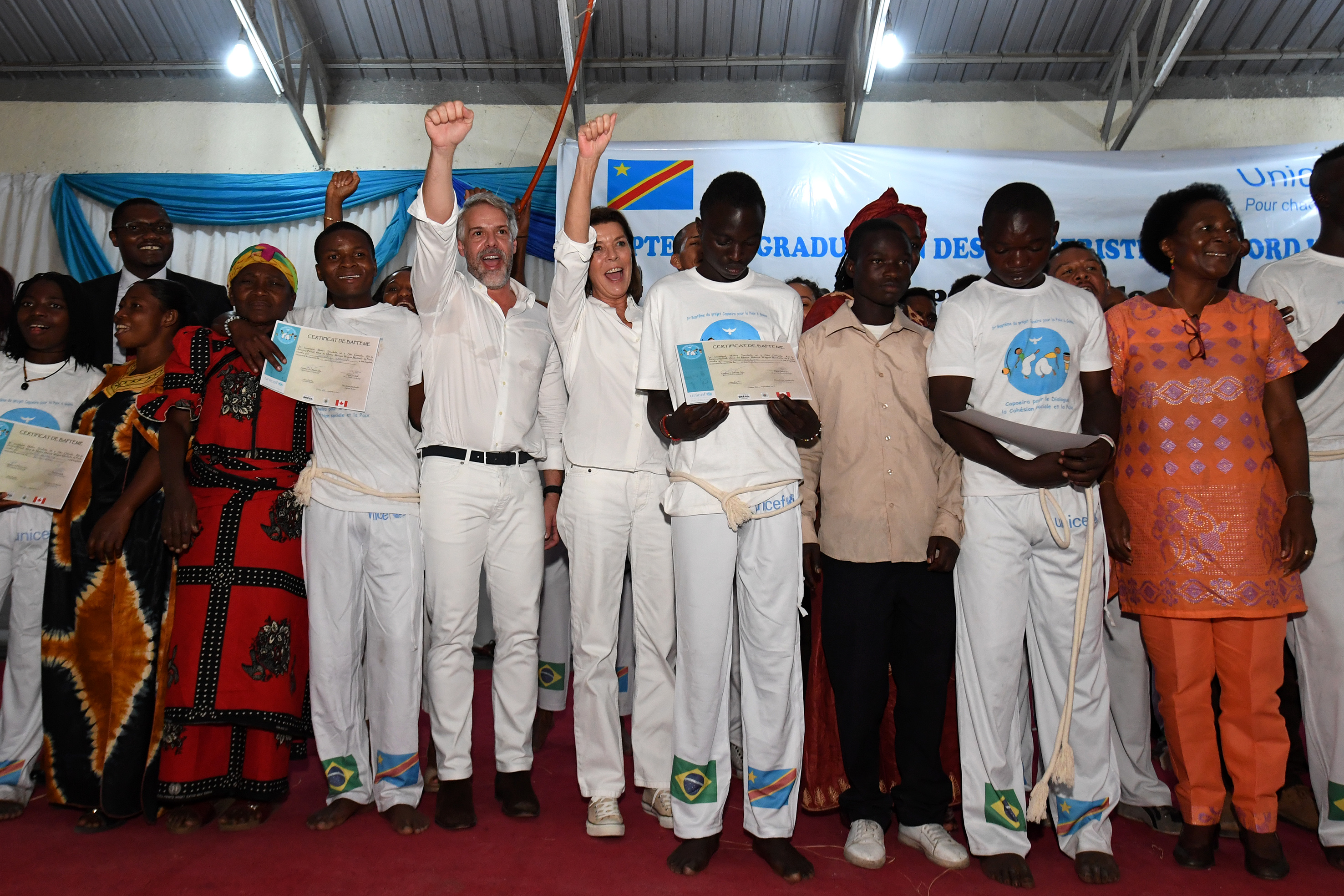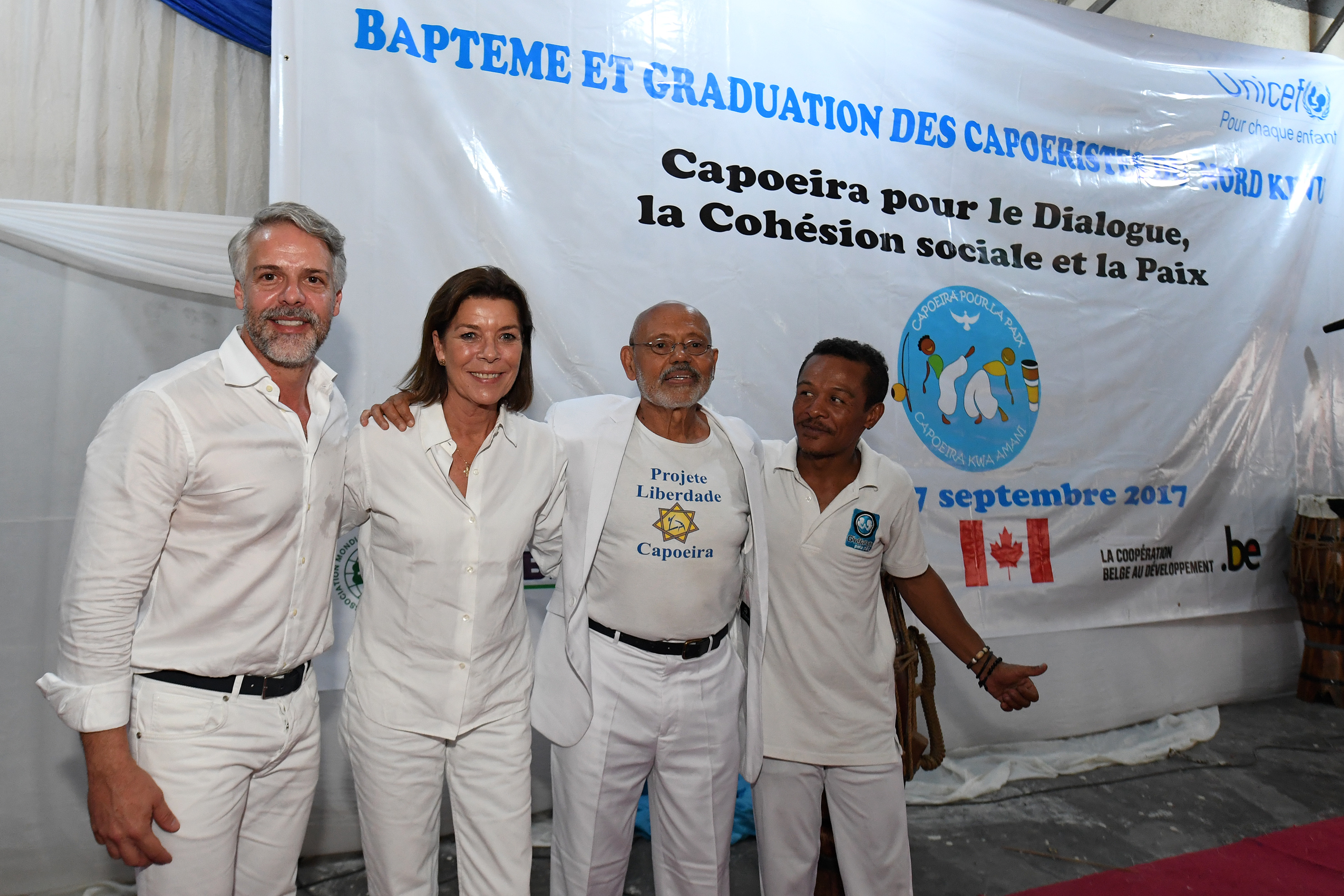After 10 years of civil war, there are now almost 4,200 children associated with armed forces and groups in the Democratic Republic of Congo, especially in both Kivus and in Katanga.
Upon the unique occassion of the HRH The Princess of Hanover's visit to Kinshasa in June 2013, the Ambassador of Brazil to the DRC, His Excellency Paulo Uchoa, and the Military Commander of MONUSCO proposed to include AMADE in a pilot project integrating the practice of capoeira into the rehabilitation and social reintegration process for demobilised child soldiers.
The partnership established in 2014 with the Embassy of Brazil in the DRC, UNICEF, MONUSCO, the Capoeira Congo Association and the Viva Rio Foundation aimed to contribute to the demobilization and reintegration process of child soldiers in the DRC, specifically in North Kivu, by integrating the practice of capoeira into the activities carried out within the institutions that welcome demobilized children. For these young people who have only known violence, this practice, combined with both a sporting and psychosocial approach, plays an important role in promoting the inclusion, equality and citizenship of children recently demobilised from armed forces and groups.
In light of the pilot project's positive results, a second phase will focus on the use of this sport and artistic discipline as a tool to complement social work in the context of comprehensive care, orientation and integration of children demobilised from armed forces and groups has been implemented.
In line with the pilot project, the aim of the project's extension was to continue the use of this sport and artistic discipline as a complementary tool for social work as part of the reintegration process of children from forces and groups back into their communities.
In 2015 the direct or indirect beneficiaries of the project were:
- the 600 children associated with the armed forces and groups housed in the NGO CAJED's Transit and Orientation Center (TOC) and the NGO PAMI's Daycare Center in the Goma region;
- 30 trainers;
- the community, made up of children's families, transitional foster families and members of the surrounding community.
For the 600 demobilized child soldiers beneficiaries, the practice of capoeira provided the opportunity to reclaim their bodies and work on respecting one another. Capoeira is indeed a sport where there are no victors nor losers, it is an inclusive practice encouraging the values of peace and tolerance. Particular attention was also paid to the specific needs of young girls associated with armed groups and forces, as well as children affected by sexual violence.
The supervisors were also trained in regards to the individual care of each child beneficiary, in order to better support the reintegration of children into their families after their stay in the transit centers. The children in the neighboring communities of the two transit centers for demobilized child soldiers were also involved in the activities in order to combat the discrimination suffered by these often stigmatized children.
3084 former child soldiers hosted in the Transit and Orientation Center (CAJED) and the Day Open Center (PAMI) in Goma
30 leaders trained as Capoeira teachers
Disarmement and Reinsertion of former child soldiers
-
Congo, The Democratic Republic Of The
Nord Kivu
-
Project status
Completed
-
Duration
2014 - 2018
-
Funding
153 996 €
-
Beneficiaries
3084 children associated with armed forces and groups
-
Partners
UNICEF
MONUSCO
FNUAP
UNHCR
Brazilian Embassy in the DR Congo
SOFIBANQUE
-
Objectives
To contribute to the demobilisation process of child soldiers in the Democratic Republic of Congo.
Testimonies
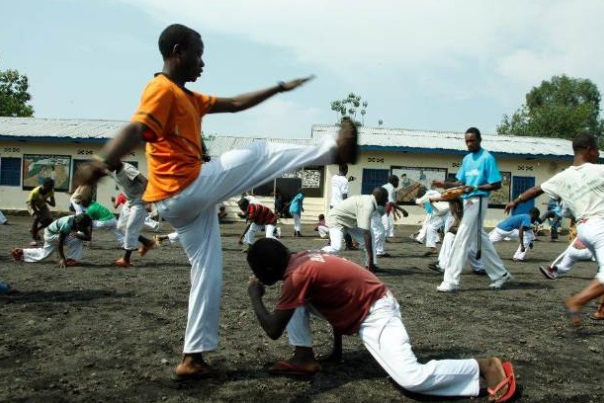
Bahati
Testimony Bahati
Bahati (pseudo), a 17-year-old boy was forcibly recruited by the rebel group ADF-NALU and taken to Uganda where he spent 2 years with the rebels. He managed to flee and return home through the forest of Beni territory.
"When the ADF was beaten by the armed forces of the Democratic Republic of Congo (FARDC), it was then that I had the opportunity to flee into the forest; I was picked up by the FARDC and it was long before I came here to the center. "
Since 2014, children living at CTO / CAJED have been introduced to Capoeira, a discipline they value because it is an educational activity that promotes tolerance and a friendly spirit. Bahati is happy to be out of the army and aspires to a bright future.
"I feel great and I have no desire to return to the army. Here, I practice capoeira with my colleagues also from armed groups, it's really a good discipline because it unites us and makes us strong.
http://www.odhasbl.org/la-capoeira-rend-plus-fort/
Close
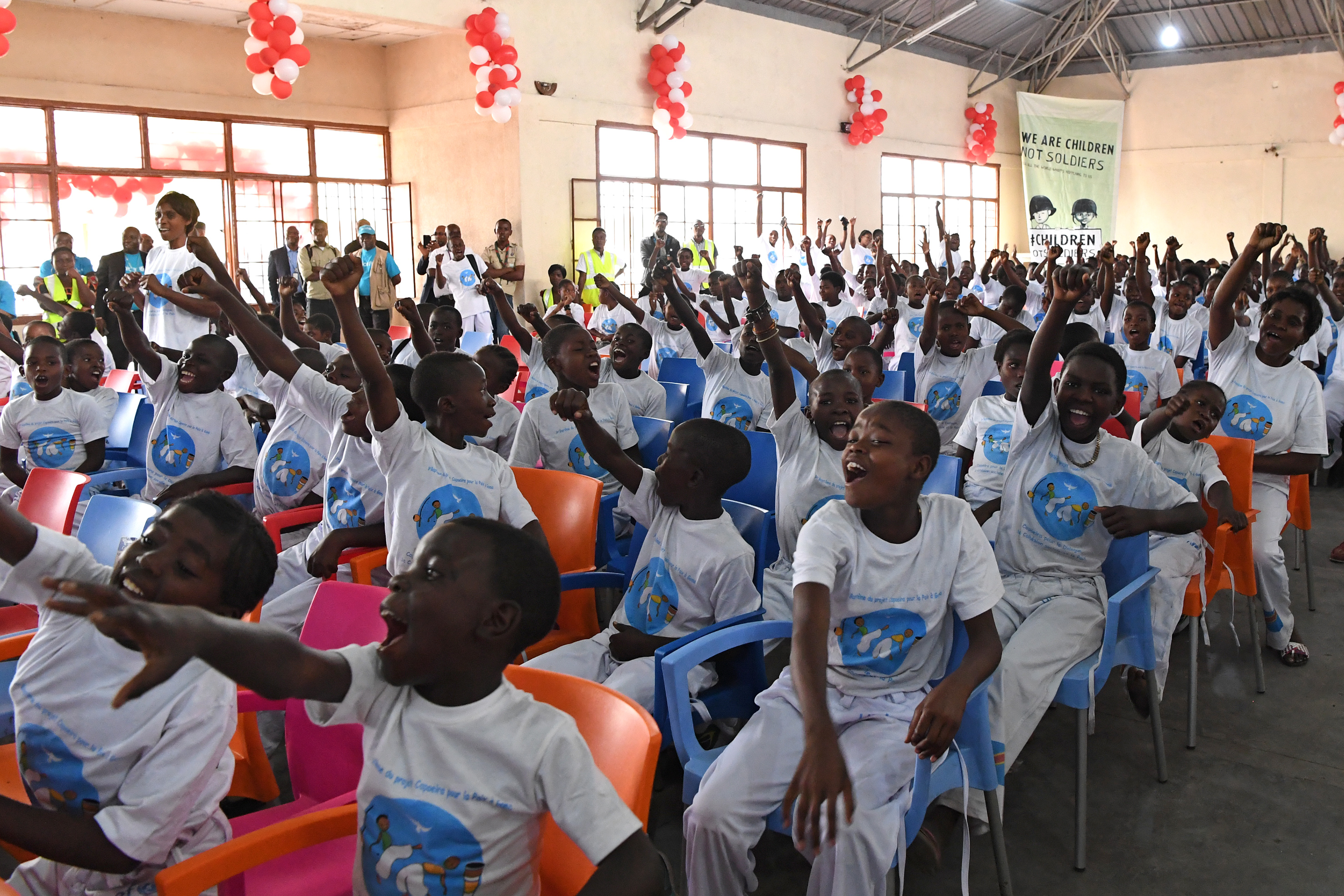
Nadia
Nadia, 17, was raped in a neighborhood in Goma and found herself pregnant when she was only 16 years old. That's where his life rocked.
"I was wondering what this child would become. How could I be able to take care of him since I myself had nothing and I was not even able to take care of myself.
After a few months of psychosocial care, Nadia was able to overcome her difficulties. She gave birth to a baby boy and started to learn how to sew and bake. She regained the taste of life after participating in several capoeira sessions. She now dreams of doing great things in her community.
Photo © Manuel Vitali
"I would like to open a training center where I will teach capoeira to young girls in the community. Capoeira helped me a lot. Girls who are going through difficult times like me need to know that hope is not lost, "she said.
Close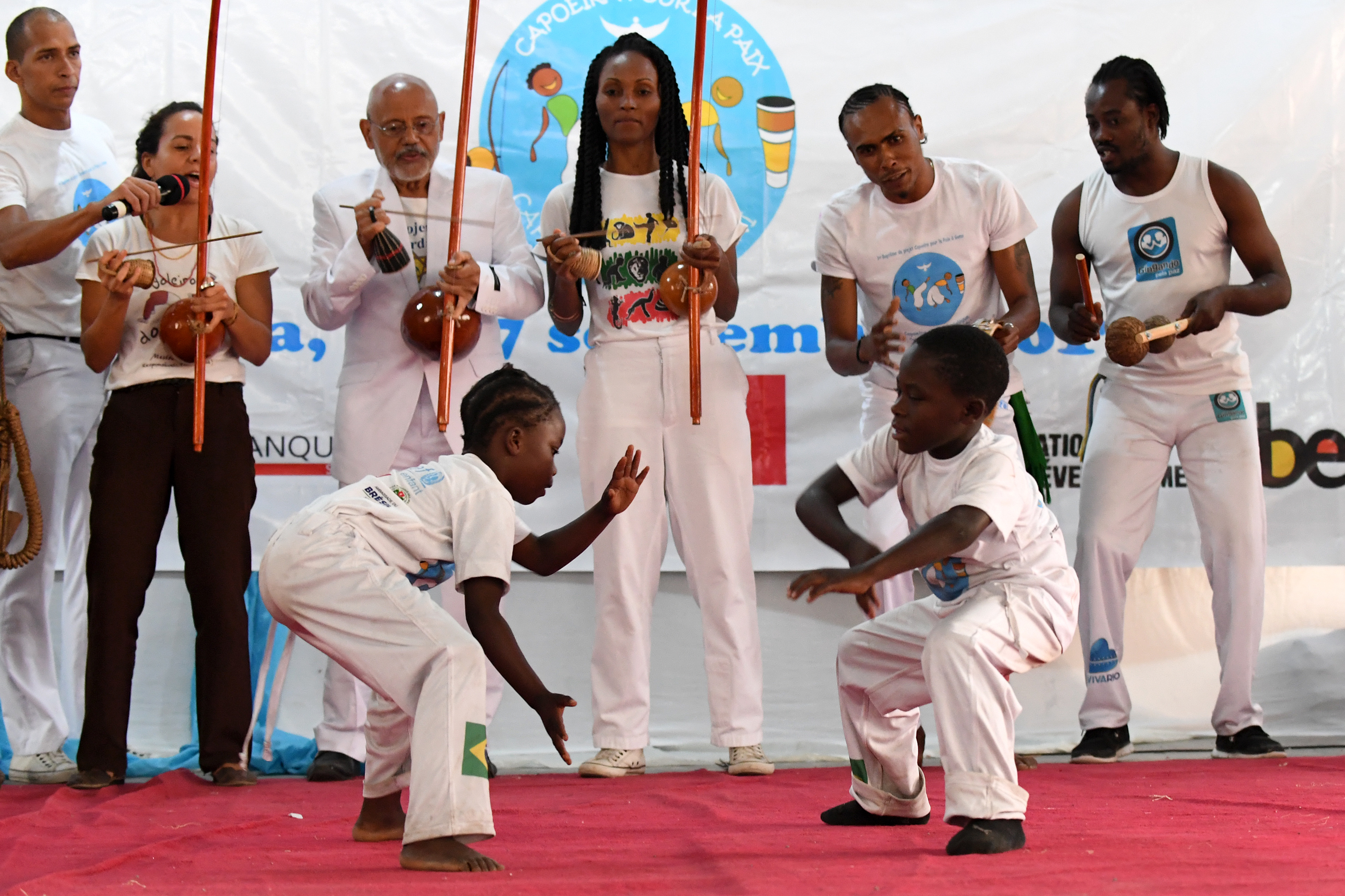
Rafael
Testimony of a trainer - Rafael CABANILLAS
In Goma, capoeira brings children back to peace
Mexican capoeirist, I arrived in North Kivu in September, to animate the project Capoeira for Peace. With Dieudonné, a capoeirist from Kinshasa, I lead the training of children from armed groups and forces in capoeira. Here is how this martial art contributes to their reintegration.
Ten years ago, I started capoeira in northern Mexico. Like many capoeirists of my generation who are not in Brazil, I discovered capoeira through the movie "Only the Strong" and the video game Tekken. At first, I did not realize that capoeira could have such cultural and social importance, so I thought it was just one martial art among many.
As part of my training as a group capoeirist, my teacher (Master Manchinha from Cordão de Ouro) asked us to help him create a social capoeira project. The idea was to teach capoeira in foster homes to children with a history of family violence and in disadvantaged areas of my city. This is where I saw capoeira as a social tool, a way to teach others, through play and martial arts, respect, knowledge of others, equality, discipline and the fruit of the effort.
When we started the Capoeira for Peace project in the Democratic Republic of Congo in September, we did not know how children would react, because capoeira is in principle an activity that requires physical skills, workouts and perseverance, and was an activity totally unknown to children. To make things easier, we tried to present it as a game, as a way of expressing ourselves ... and the children loved it! The fact that capoeira is a mixture of music, acrobatics and physical movement has allowed children in different centers to acquire the capoeira pole ("little by little" in Swahili, the language spoken in Eastern country).
What I've learned since I arrived in Goma, where the project is taking place, is that we all too often forget that children need fun, recreation and sports.
These games and hobbies, used wisely, have the power to develop intelligence and act as psychosocial tools very powerful.
Throughout this month, we have seen both the psychomotor abilities of children grow stronger, but also their attitude in the classroom and in the center improve. On that, we build together the values of peace, tolerance, listening and respect for others. The coaches who train with the children have not only noticed a difference in their relationship with them, but also between them, beyond their differences.
The progress is there but a difficulty remains: in the transfer centers, our commitment to the children is only temporary (a month and a half to three months, until the child is reunited with his family). So we have little time and yet our goals are very ambitious.
For this reason, one of our objectives is to gradually open the various centers to neighboring communities. We want the community to be part of the project, first to start the social reintegration of children and secondly to try to reduce the stigma attached to the center. The idea is that children who are stigmatized because of their assimilation into armed groups can come into contact with the population outside the center. This openness to the community is already in place: we have opened courses for the outside community in a day center. Fifty people of all ages and sexes came to register to share these moments with the children of the center.
We know that our intervention gives results gradually; we are aware of the challenges but we remain optimistic. To date, the project is already reaching 250 people and courses are offered in a transfer center, a day center and a school. Our work does not stop at the supervision of the children of the center: our mission is also to train the coaches and to sensitize the partners and the community around the centers. We must keep in mind that much of our success comes from the work our partners do for the reintegration of children:
"working together helps build a sustainable future for all."
Rafael Cabanillas is the coordinator of the pilot project "Capoeira for Peace" in Goma. Sharing with children through this project in an atmosphere of friendship and respect is one of the most moving experiences of her life. His vision of peace: "peace is not a singular attempt but a commitment to work there every day and at every level of our life".
Photo © Manuel Vitali
Close
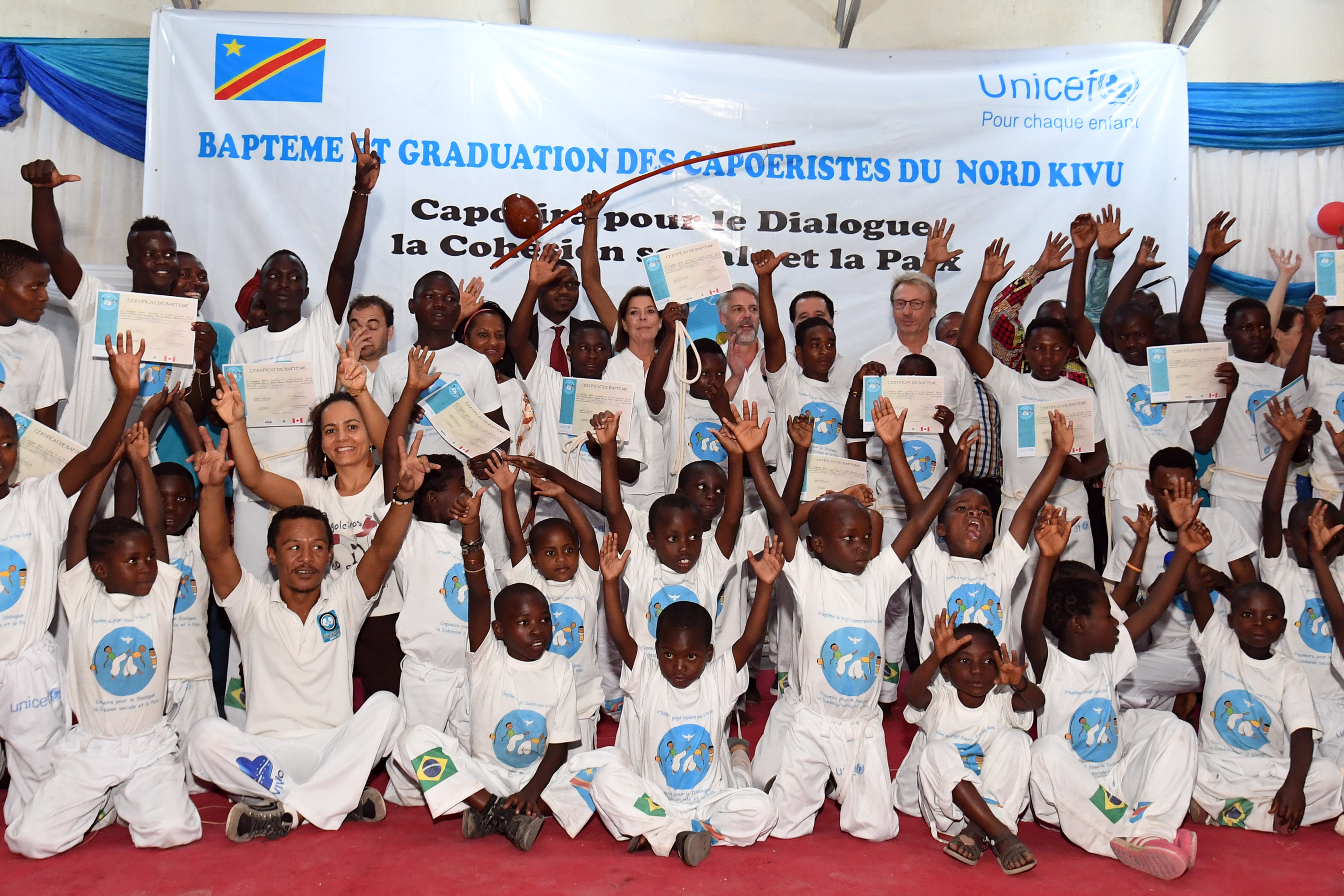
Innocent
For boys aged 12 to 16 at the Transition and Orientation Centre (TOC) in Goma, which is managed by the CAYDC (Concert of Actions for Young and Disadvantaged Children) association with the support of UNICEF, the day starts with breakfast at 7am. The young people are then divided into different groups to follow courses (refresher courses or beginners classes) of their choosing in literacy, drawing, sewing, singing, music or dancing. In the afternoon, after the meal and accompanied city outing, they relax: today, Dieudonné has come to introduce them to capoeira!
The 37 young people who live here are all recently demobilised child soldiers. The transit and orientation centers have been set up to deal with the mass influx of children demobilised from armed groups: since 2004, there have been between 3000 and 4000 armed groups in the eastern Democratic Republic of the Congo. In 2013, at the peak of its activity, the centre welcomed 188 children during a wave of militia demobilisation following the departure of the M23. UNICEF places all demobilised child soldiers in foster families as soon as is possible, before reuniting them with their families. When the number of children exceeds the childcare capacity, priority is given to girls and boys go to a TOC, for a duration of less than 3 months usually.
Innocent arrived at the centre 18 days ago. At the age of 13 (he is now 15), he voluntarily joined the Mai-Mai Pareco, a self-defense militia in the Masisi in North Kivu because "all his friends in the neighborhood had already enlisted". Innocent was in 2nd grade, went to school every day and liked it. But he was influenced by his friends who told him that he would eat meat every day, and that he would be given clothes and boots. "At home, we could go more than 2 weeks without me eating a piece of meat. At PARECO, I was there to cook, so I was able to eat meat up to 3 times a week. I did not get any clothes or boots, but when we went to plunder villages we could have them then. On the other hand, the rest of life was bad. As soon as I made a mistake, I was beaten. I was beaten for nothing, for example if they found me at the well, they said I was taking too much time and they would whip me. There was not a week that went by where I was not beaten." After four months of this regime, and despite repeated threats that they would come and take him back from his home if he ran away, Innocent fled with two friends.
The respite was short-lived; enough time to learn that his father had died. Two days after returning home, another Mayi-Mayi militia came to plunder his village, and Innocent was captured with another child. The militiamen asked them to escort the goats they had plundered to their camp, and did not let them go. Innocent stayed with them for more than a year and a half. He was appointed "chief escort"; when the commander was on the move, he had to run ahead and clear the path for him. He received a gun and never left the commander's side - even going to sleep beside him. One year after he was captured, Innocent participated in his first fight, which was against a rival militia, the Nyatura. "I saw people die. I was afraid," recalls Innocent. "I had to shoot a fugitive because the commander ordered me to."
Six months later, the Nyatura, assisted by the Democratic Forces for the Liberation of Rwanda, responded. While everyone was running away, Innocent took the opportunity to escape, walking alone for two days to reach the MONUSCO camp in Kitchanga. Though he had left his rifle in his escape, he succeeded in proving that he was a child soldier by brandishing his military gourd.
Innocent has no news of his family; he just knows that they have moved to flee the fighting, and that one of his brothers has also joined an armed group. Returning to civilian life is often complicated for uprooted young people who have been accustomed to eating or obtaining anything with a rifle. In the villages where they come from - if they can return, they will face poverty and will have to work in the fields, which is a painful activity that pays little. A minority will return to the armed group, for convenience sake. But others will study and achieve their dreams.
Innocent dreams of becoming a doctor.
Photo © Manuel Vitali
Close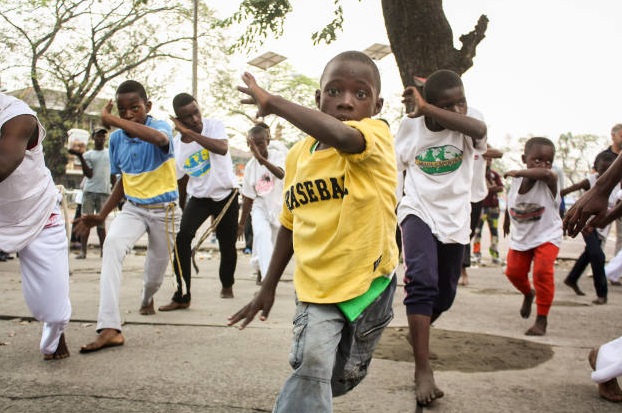
Témoignages
testimonials during the closing show of the training (August 2016) at Heal Africa Hospital
http://ponabana.flywheelsites.com/category/protection/capoeira-for-peace/
It all started with a rally and warm-up of the children who were led by Alex and Ninja, two capoeira trainers working at UNICEF. Then, the children and adolescents explained the benefits they gained from learning capoeira and how they feel now after such a long learning moment.
Charlotte, a child from the Heal Africa center, explains: "Capoeira taught me to respect others, to live with my family, to get closer to others. It brought me changes at the physical level and the mental level, it brought me total distress.
Many parents who have accompanied their children are also very satisfied because capoeira has made a real difference to their children. Charlotte's mother explains, "We say thank you to Heal Africa and UNICEF for thinking of teaching capoeira to our children. Before my child was very shy, he was isolating himself from others, he was very inactive but today, thanks to capoeira, my child begins to express himself, to be active and he wants to be part of a group of children; really capoeira has just transformed my child. "
Capoeira today brings hope and a taste for life to children and learners, according to Flavio, who specializes in child protection at UNICEF East Zone and at the same time masters capoeira. For him, before learning from others, he first learns himself: "Capoeira helped me a lot because when I was young my parents abandoned me and left for drug trafficking. It is with capoeira that I find the meaning of my life because from a young age I learned this discipline and it allowed me to finish my stress and to feel still useful and important; That's why when I teach children I feel really good. "
http://ponabana.flywheelsites.com/category/protection/capoeira-for-peace/
CloseSee the latest news about this project
- Innocent, 15 years old: The story of a former child soldier
- Young boys who benefited from the AMADE programme "Capoeira for Peace" now teach Capoeira to reconnect Christians and Muslims
- First assessment of the Capoeira for Peace program
- Concert of the OPMC for the benefit of AMADE
- Charity concert of the OPMC for the benefit of AMADE
 L'Amade
L'Amade